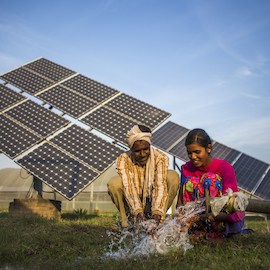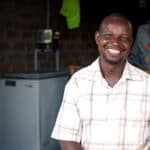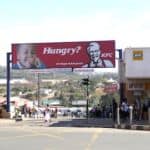Productive Use of Power (PUE) applied sciences, similar to photo voltaic water pumps, refrigeration and stitching machines, are essential for serving to smallholder farmers and different microentrepreneurs generate incomes, both via beginning a brand new enterprise or bettering the economics of an current one. However their up-front prices stay prohibitive for these on the Base of the Pyramid (BoP). For instance, a photo voltaic water pump can simply value over US $700, whereas a walk-in chilly room can value greater than 10 occasions this value.
Promoting income-generating home equipment that may value nicely above $1,000 to a low-income farmer or microentrepreneur places all the chance on the farmer/entrepreneur and their enterprise. To be able to realise the true potential of PUE, the social enterprise sector wants to plot new enterprise fashions that take away this danger in order that essentially the most weak can entry these life-changing applied sciences.
Three Approaches to Bringing PUE to the BoP
1. SERVICE MODELS
The true worth of a PUE equipment is sort of at all times the service it might probably present. Due to this fact, slightly than promoting a machine, an organization can supply that system’s service for a payment. By way of this service mannequin, microentrepreneurs and farmers can use costly PUE merchandise, no matter their revenue degree. This mannequin may higher match the fluctuating incomes which might be frequent in actions like farming, permitting prices to be incurred throughout harvest time, when farmers are producing extra revenue.
That is one thing that’s already generally performed amongst smallholder farmers in lots of elements of the world. In India, to take one instance, a wealthier farmer will put money into a diesel irrigation pump and hire it out to their neighbours by the hour. In Uganda, a farmer will create further income by hiring out their oxen, thereby offering dozens of farmers with entry to the power of this highly effective beast with out requiring them to put money into their very own animal.
Companies have additionally begun to embrace this observe. As an illustration, SokoFresh has adopted a novel method in Kenya that makes the benefits of chilly storage accessible to smallholder farmers. With a conventional gross sales mannequin, the corporate’s off-grid, solar-powered, walk-in chilly rooms can be prohibitively costly for these farmers, as they value hundreds of {dollars}. So as a substitute of making an attempt to promote this expertise to the farmers immediately, SokoFresh takes on the function of a contemporary produce purchaser. It supplies farmers with recommendation and coaching to assist maximise the standard of the avocados, bananas and pineapples it buys from them. Then it utilises its chilly rooms to make sure that this produce doesn’t spoil within the time it takes to supply it from a number of small farms. This enables SokoFresh to carry high-quality produce from smallholder farmers to bulk consumers and even exporters who’re keen to pay greater costs. This method not solely advantages smallholder farmers by offering them with higher costs and lowering post-harvest losses, it additionally spares them from the monetary burden of investing in such cooling expertise. Moreover, SokoFresh provides cooling-as-a-service to exporters, who hire its chilly rooms to allow extra environment friendly produce assortment from the smallholder farmers they’ve contracted.
The service mannequin method is especially helpful for farmers, as the size of smallholder farms hardly ever justifies the price of these applied sciences. However to make it worthwhile for corporations, they need to be certain that their gear is continually utilized by farmers all through the altering seasons. SokoFresh does this by making its chilly rooms moveable. Following the harvest of various vegatables and fruits, the corporate strikes its gear throughout completely different areas to make sure that its chilly rooms are at all times stored full. Improvements that may resolve this utilisation-rate problem will likely be key to scaling-up service fashions for different productive use home equipment.
2. COMMUNITY OWNERSHIP
Service fashions supply quite a few advantages, however a possible problem they face is the focus of wealth amongst those that can afford to pay the excessive up-front prices of investing in their very own PUE gear. It falls upon social entrepreneurs to make it possible for the benefits of these companies attain folks residing in poverty. Methods of shared possession can tackle this by making certain that these advantages are unfold among the many group, resulting in higher impacts on the incomes of the poorest. Promethean Energy Methods is taking this method to carry the advantages of decentralised milk chilling to farmers in India. In Maharashtra, the place Promethean works, many households generate a small further revenue by tending to at least one or two cows and promoting their milk, an exercise that’s often managed by the ladies of the family. However restricted entry to markets and inefficiencies within the assortment of milk have led to frequent wastage, and brought on farmers to obtain unfair costs for his or her milk from dairy corporations. In consequence, farmers have restricted confidence to put money into increasing their dairy actions.
Promethean solves this problem by leveraging a community-ownership mannequin to offer micro milk chillers which might preserve 4 to 6 cans of milk contemporary. It sells the chillers up-front or by way of a pay-per-use mannequin to teams of 10 to fifteen ladies that goal to construct sustainable livelihoods by way of dairy farming. Promethean additionally ensures that these teams have dependable entry to a marketplace for their milk by buying the milk collected on the micro-chiller. Typically facilitated by Promethean and its NGO companions, these ladies can kind a Farmer Producers Group (FPG), which provides them quick access to low-cost loans to increase their dairy farming and enhance their earnings per litre of milk they produce — as an illustration, by buying new cattle varieties. As a part of this collectivisation, one group member is chosen to gather, take a look at and measure the milk every morning and night. However all of the group members share the revenue generated by the micro-chiller, which permits them to promote higher-quality milk to Promethean for a good value slightly than promoting to lower-paying dairy corporations. The shared possession mannequin additionally retains utilisation charges excessive and unit economics worthwhile.
The success of this mannequin hinges on two essential facets: market off-take and partnerships. Promethean has established a powerful partnership with numerous group stakeholders, together with Swayam Shikshan Prayog (SSP), an NGO that has been working inside the similar communities for greater than a decade to coach teams of ladies farmers on new practices to enhance their livelihoods. By tapping into the robust group relationships and experience of companions similar to SSP, Promethean has been in a position to quickly increase its group possession mannequin to new farming collectives, and to scale this mannequin to empower smallholder farmers to construct worthwhile dairy companies and extra sustainable livelihoods.
3. SELLING TO ESTABLISHED MICROENTREPRENEURS
These service fashions and shared possession approaches lend themselves notably nicely to many PUE functions inside agriculture, however they don’t seem to be at all times sensible for some agri worth chains or different forms of companies. Generally, power home equipment solely make sense when owned and operated by one consumer, similar to a hair clipper utilized in a barber store or a fridge utilized by a shopkeeper to promote chilly drinks — objects that may be tough to share with out impacting the proprietor’s enterprise. And simply because a PUE equipment ought to generate revenue, that’s no assure that it robotically does. When a farmer or microentrepreneur invests in an costly PUE equipment there’s a massive danger of over-indebtedness, making it all of the extra essential that the equipment drives a rise of their revenue.
One method to mitigating this danger is to concentrate on established enterprise instances. Each PUE product will have an effect on a microentrepreneur’s unit economics in a different way, so figuring out companies with low failure charges and fast funding returns on the power equipment is vital. PUE merchandise that match this invoice may embody home equipment that generate enhancements to the economics of an current enterprise (e.g., changing diesel or petrol turbines with photo voltaic techniques), or those who repair inefficient worth chains (e.g., freezers for fish merchants). Offering clients with financing to allow them to repay the excessive up-front value of those gadgets over time is much simpler if the shopper is ready to make small, common funds. So (absent a service mannequin like these mentioned above), companies that may ship regular year-round incomes will likely be extra applicable when promoting PUE home equipment on finance, in contrast to people who solely earn revenue two or thrice a yr, similar to arable farming enterprises. However whatever the sector their clients work in, corporations making an attempt to promote PUE merchandise on finance want to contemplate what different assist these farmers or microenterprises may have to make sure that their funding turns a revenue.
Winock Photo voltaic has taken on this problem to promote photo voltaic house techniques and PUE home equipment on credit score to microentrepreneurs in Nigeria who’re in any other case reliant on petrol-powered turbines. Winock has centered on home equipment that may ship common incomes, similar to store freezers, stitching machines, hair clippers for barbers and chargers for telephone charging companies. It has additionally partnered with a microfinance establishment to facilitate stock credit score — one of many greatest challenges dealing with small companies in Nigeria. By specializing in particular forms of companies, and supporting them past the power product itself, Winock has been in a position to present a product that prices as a lot as $2 per day to a buyer section residing on lower than $3.20 per day. In line with a latest research of Winock’s clients carried out by 60 decibels, these microentrepreneurs signify 44% of the corporate’s clients.
What’s wanted to make PUE inclusive
Productive makes use of of power have the potential to create pathways out of poverty for tens of millions, however challenges nonetheless stay in placing that potential into observe. As bigger and costlier productive home equipment come to market, we’d like extra variety in enterprise fashions that transfer past direct possession and keep away from burdening the poorest with heavy money owed. The shared, decentralised infrastructure offered by PUE home equipment and the photo voltaic power techniques that energy them can allow even the poorest farmers and microentrepreneurs to entry the advantages of those applied sciences — and new enterprise fashions are beginning to make these options scalable. However simply as importantly, as Acumen has argued earlier than, new tech alone doesn’t robotically translate to extra revenue.
We should transcend specializing in merely promoting PUE merchandise to additionally interact the ecosystem that surrounds that new asset, from providing market entry, to offering complementary merchandise. This can be certain that these productive use home equipment meet their true potential of delivering improved incomes and livelihoods for these residing in poverty.
Christopher Emmott is the Affiliate Director of Investing in Power Entry at Acumen.
Photograph credit score: IWMI/Prashanth Vishwanathan.



